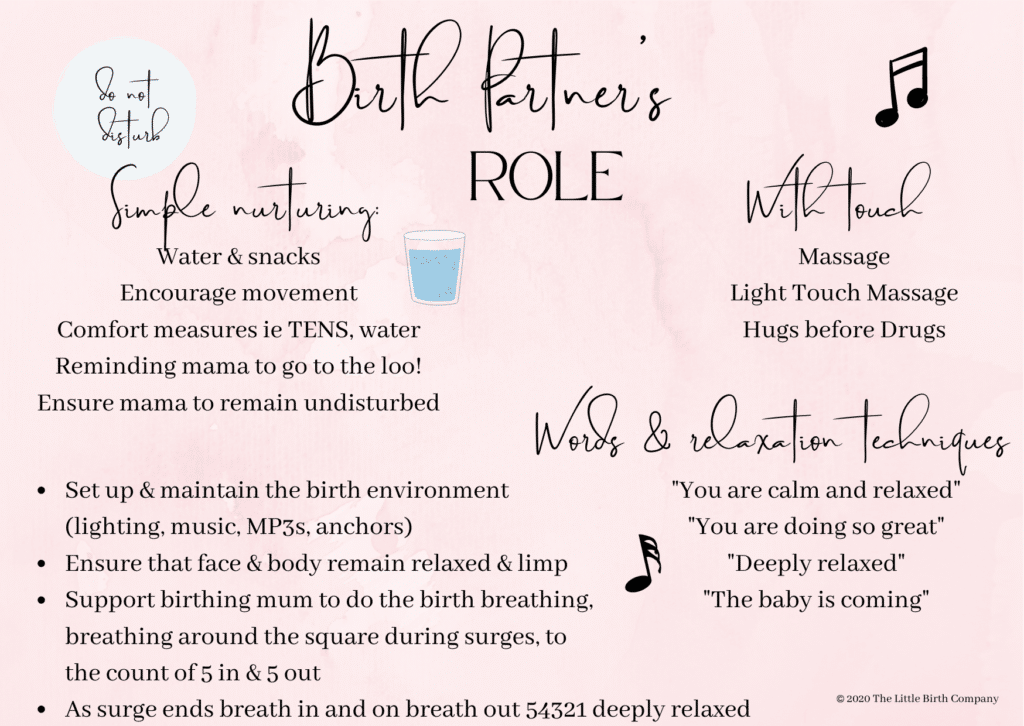The role of the birth partner – and their hospital bag!
The birth partner, also known as a labor support person, is an important member of the birth team who provides physical, emotional, and informational support to the person giving birth during labor and delivery.
Your birth partner could be your husband, your wife, your girlfriend, or your boyfriend, it could be your mother, your sister, your best friend, or your doula. The most important is, that your birth partner supports you and your choices, and knows your preferences so that they can be your advocate.
Their role is to assist you in various ways, including:
- Providing emotional support: The birth partner should provide encouragement, reassurance, and positive affirmations throughout the labor process. They can also help you manage anxiety and stress.
- Offering physical support: The birth partner can help the birthing person find comfortable positions, provide massage, and offer water or snacks.
- Advocating for you: The birth partner can act as an advocate for the birthing person, ensuring their wishes and preferences are respected and communicated to medical staff.
- Providing information: The birth partner can help the birthing person understand the different stages of labor, the medical interventions available, and the potential risks and benefits of each option.
- Assisting with practical tasks: The birth partner can help with tasks such as packing a hospital bag, transportation, and managing communication with family and friends.
Ultimately, the role of the birth partner is to provide continuous support throughout the labor and delivery process, ensuring that you feel safe, empowered, and supported.

What to pack as the birth partner?
Ideally, the birth partner has their own hospital bag, so that things don’t get mixed up. The last thing you want to do is to look for refreshments or papers in the midst of labor.
When packing a hospital bag as the birth partner, it’s important to consider the length of the stay and what items will make your time in the hospital more comfortable. These are some useful things to pack:
- Comfortable clothing: Pack a few changes of comfortable clothing for the birth partner, including pajamas, a robe, and a change of clothes for going home.
- Toiletries: Bring a toiletry kit with items such as a toothbrush, toothpaste, deodorant, and any other personal care items the birth partner may need.
- Snacks and drinks: The birth partner may not have access to food or drinks while in the delivery room, so it’s a good idea to bring some snacks and drinks that are easy to eat and drink during breaks in labor.
- Entertainment: Bring books, magazines, or other forms of entertainment to pass the time during the labor process.
- Phone charger: Make sure to bring a phone charger to keep devices charged and ready to use.
- Camera or video recorder: If the birth partner plans to capture photos or videos of the birth, bring a camera or video recorder with extra batteries or charging cords.
- Cash or credit cards: Bring some cash or credit cards for parking, vending machines, or other incidentals that may arise.
- Hypnobirthing playlist: Songs that the birthing person loves to get that booty shaking during the first phase of birth!! Calming and relaxing music for the last phase of labor.
It’s important to remember that the birth partner’s focus should be on supporting the birthing person, so pack items that will make their time in the hospital more comfortable and stress-free.
Learn about the role of the birth partner and so much more in my hypnobirthing course
Hypnobirthing is a childbirth education program that teaches relaxation, visualization, and self-hypnosis techniques to help women have a more comfortable and positive birth experience. Here are some benefits of doing a hypnobirthing course:
- Reduces fear and anxiety: Hypnobirthing teaches techniques to help women reduce fear and anxiety around childbirth. This can help them feel more confident, relaxed, and in control during labor and delivery.
- Increases comfort: Hypnobirthing techniques such as breathing exercises, visualization, and self-hypnosis can help women manage pain and discomfort during labor and delivery, potentially reducing the need for medical interventions.
- Shortens labor: Hypnobirthing techniques can help women relax and stay calm during labor, which can lead to shorter labors and less exhaustion.
- Promotes bonding: Hypnobirthing techniques can help women feel more connected to their babies and partners during the birth process, promoting bonding and attachment.
- Improves birth outcomes: Studies have shown that hypnobirthing can lead to better birth outcomes, including fewer interventions, fewer c-sections, and shorter hospital stays.
- Empowers women: Hypnobirthing helps women feel more empowered and in control during the birth process, which can lead to a more positive birth experience and greater satisfaction with the overall birthing process.
Overall, hypnobirthing can provide women with the tools and techniques to have a more positive, relaxed, and comfortable birth experience. It can also help partners feel more involved and supportive during the birth process.



